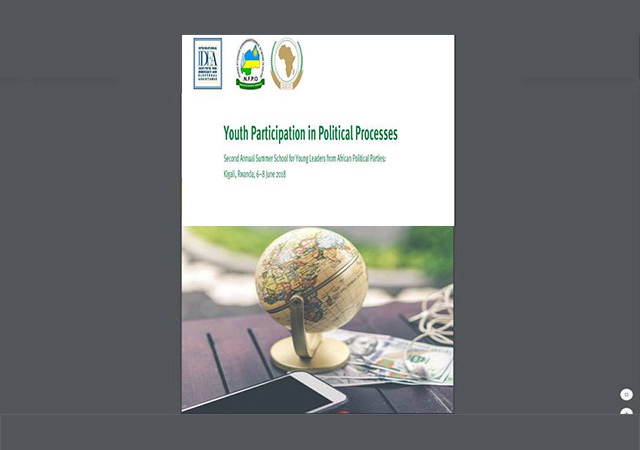 Brochure from Second Annual Summer School for Young Leaders from African Political Parties:
Kigali, Rwanda, June 2018.
Brochure from Second Annual Summer School for Young Leaders from African Political Parties:
Kigali, Rwanda, June 2018.
[This is an extract from a research article appearing in the current special edition of The Round Table: The Commonwealth Journal of International Affairs.]
We explore the contributions of social media use to youth political participation in response to mixed results, Western-centric dominance of the extant findings, calls for further crystallisation of political significance of social media, and increasing influence of social media on youth’s social and political actions in developing democracies. Using Kwara State, North Central Nigeria, reputed to be the heartbeat of youth’s political activism during the 2019 Nigerian general election, we elaborate the established model of social media–politics symbiosis by incorporating factors promoting media-centric political behaviour, mainly capacity to engage in politics as theorised by CVM and conceptually bolstered by political knowledge and political efficacy. The findings confirmed the argument that decreasing political participation among the youth is not total and final as young people are finding a safe heaven in alternative, online political engagement. This form of soft politics compensates for youth’s mainstream political disempowerment occasioned by hierarchical, cost-intensive, and power-based politics that have been mastered and dominated by an entrenched political class (International Institute for Democracy and Electoral Assistance). The ebbing of democracy into gerontocracy in the developing world in general and Nigeria in particular, coupled with a contractionary economy that is threatening survival and upward mobility of the youth, fits the grievance model of political apathy and civic alienation that privilege alternative political paradigm among young people.
Our findings also affirmed scholars’ conclusions that, far from disengaging, youths are compensating for their political marginalisation through action-oriented engagement and using the highly democratised space of social media to communicate, discuss, mobilise and coordinate social actions aimed at holding power accountable. This much is evidenced by the plausible contribution of social media use to online political participation. By incorporating the CVM, an established resource-based theory of political participation, the study not only espoused the heuristic value of the model, but also affirmed its amenability to the new public sphere of digital politics (see also Kim & Khang). Besides lowering the cost of participation, thus diminishing the centrality of economic resources in political engagement, social media facilitate affordance of other dimensions of civic volunteerism by offering means of enhancing citizens’ political efficacy and civic competence (psychological engagement) while facilitating opportunities for attraction and mobilisation of the youth through various social networks existing on the platform (recruitment).
Across the levels of analysis, the study found significant contributions of political knowledge and political efficacy to the relationship between social media use and political participation. While this has been a long-established truism in media–politics calculus, it is reassuring that the social media platforms offer opportunities for citizens to acquire political knowledge via online discussion thus increasing their internal and external political efficacy and stimulating participation. The success of the youth in the Occupy movement and other forms of ‘soft’ political engagements, including volunteerism during disaster, is a signal to their capacity to function not only as actualising citizens, but also as dutiful ones known with previous generations. This finding also confirmed the long-held notion that an informed and critical citizenry is the lifeblood of democracy.
The limited contribution of social media to offline political participation calls for concern about the future of democratic and participatory culture. This disquieting development associated with youth indulgence in a comforting and compatible information atmosphere, which limits encounters with pluralistic viewpoints necessary to build civic competence, is fundamentally rooted in social media algorithmic mechanisms that narrow information to the needs of members of a network. Hence, young people on the social network sites are exposed to a limited societal agenda with consequences for their inability to coalesce efforts with other members of society on critical political projects for the benefit of all. The consequence of these findings in a fragmented polity like Nigeria is ominous, given the penchant of members of the entrenched political class for exploitation of political loopholes. It is thus imperative to continue exploring factors that could facilitate young citizens’ return to a political culture of institutionalised engagement.
These findings undergird the need for key political stakeholders to renegotiate their communications and engagements with the youth. The dialogic potential of social media should be annexed to reach out to and appreciate the concerns of young people. Genuine communication through these platforms would engender mutual trust that could gear the youth towards taking up new political challenges. More importantly, proactive engagement of the youth with government activities could create a transparent outlook that attenuates the potency of fake news, which is one of the most challenging socio-political infirmities of the contemporary media–political ecosystem. Being interactive platforms, government should take genuine and progressive social media comments seriously, including appropriating relevant comments for policy action. The election system should also be transformed to meet the contemporary reality of the digital age through electronic reforms. Rather than undermining youth’s radical approaches to politics and governance, young people need to be altruistically engaged with a view to channelling their creative energy towards creating a better society for all.
Lambe Kayode is with the Mustapha Department of Mass Communication, University of Ilorin , Ilorin, Nigeria and Bahiyah Omar is with the School of Communication, Universiti Sains Malaysia , George Town, Malaysia.



